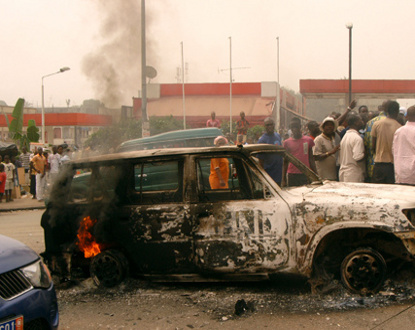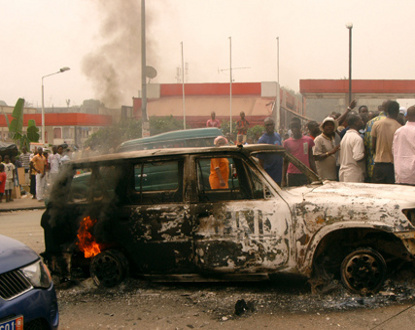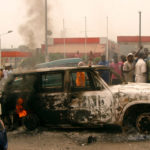Our consultant on Africa, Macarie Dagry, sends us a contribution concerning the situation in Côte d’Ivoire.

-Should L. Gbagbo be kept in Côte d’Ivoire or allowed to leave?
Côte d’Ivoire is currently experiencing decisive and crucial hours for its future. After cowardly killing defenseless civilians, a brutal and violent confrontation was expected between the different opposing armed forces on the ground.
To everyone’s surprise, and much to the relief of the civilian population, L. Gbagbo’s defense and security forces are deserting by the hundreds and rallying to the Ivorian republican forces. There is a general debacle including within the army’s general staff. Thus, the “hell” proclaimed by L. Gbagbo to his supporters did not occur. Quite the contrary, for several days now, he has been negotiating a way out. The acceleration of events leads us to believe that the battle for Abidjan will therefore not take place, and we welcome this.
History will surely remember that we managed to avoid the Rwandan scenario. It has now been several weeks since Gbagbo was supposed to speak on television, and to this day, no one has heard from him, knows where he is or what he plans to do with the thousands of young people he has led into a suicidal dead end. Blé Goudé is nowhere to be found, as well as several Hawks of LMP. In a logic of worsening the situation and chaos, the Gbagbo regime has released all prisoners from Abidjan’s prisons and surrounding towns. The ongoing negotiations are currently in favor of the elected president who is imposing his choices in this power struggle which is now to his advantage.
The night from Wednesday to Thursday was very long and full of movements. Sitting around a meal, on the terrace of a restaurant, on the Côte d’Azur and in the company of brother Venance Konan, we wondered about the best strategy to adopt to save peace in Côte d’Ivoire.
And what should we do with L. Gbagbo and his wife?
Should L. Gbagbo be allowed to go into exile and enjoy his billions with his wife?
At this stage of the events, at the time of writing this column, the question remains very open and delicate. One could simply answer that “the essential for saving democracy as well as individual and collective freedoms in Côte d’Ivoire” would be for Gbagbo to recognize ADO as the elected president and apologize to the Ivorian people for his political mistakes. Normally, in a democracy, this logic could be part of a conventional democratic process.
However, in the case of Côte d’Ivoire, the analytical frameworks of the post-electoral situation are complex and heavy with consequences. Suppose that the new power of the elected president decides to let the former head of state go into exile with his wife. How will the populations, bruised by the barbarities and killings of this regime since 2000, live with this? Isn’t there a risk that this political act by the new power, for which they have sacrificed, could backfire against it and its president? How could the traumas, mourning, and wounds be healed to establish national reconciliation?
Some political observers think that Gbagbo, once out of the country, strong with his five billion euros hidden around the world, according to a Swiss newspaper, could do everything to destabilize the new power. This hypothesis seems unlikely to us. For that, he would need to have reliable contacts within the army and security and defense forces. One can imagine that all the defections of the officers from the former power will ensure they are loyal and reliable to the newly elected head of state. And for that, they will have to provide evidence of their sincerity by making compromising revelations to save themselves.
For example, where is General Mathias Doué? Why haven’t we heard from him? He should have come forward and participated in this restoration of the rule of law and democracy carried out by the republican forces. Why did General Philippe Mangou seem so hostage within the defense and security forces’ general staff he was supposed to lead on paper, but in reality led by General Dogbo Blé of the presidential guard? All these questions indeed complicate any potential decisions regarding allowing the Baker who finally turned into the “Butcher of darkness” to leave.
Should L. Gbagbo be kept in Côte d’Ivoire? And to what end?
The disasters and abuses committed by the “Butcher’s” regime might advocate for this decision so that justice can take its course. However, in a logic of seeking calm, reconciliation of populations, peace, and in the spirit of coexistence defended by the elected president, the new power may legitimately decide to keep him in Côte d’Ivoire. For what purposes?
On one hand, so that he participates in peace and reconciliation efforts. As a major actor in Ivorian political life, it would be understandable that he contributes to these efforts by personally getting involved in such a way as to set an example to his supporters whom he has armed and who could still remain potentially dangerous. For the new power, his participation in this peace and reconciliation effort could be crucial to calm tensions and hatred among the Ivorian population.
On the other hand, keeping him in the country could also address security and justice concerns. Perhaps having him in the country under surveillance can prevent possible “destabilization maneuvers” by the former “Baker” turned “Butcher.” The consequence of this decision, if taken, might also have contrary effects. By acting in this way, the Ouattara power could elevate the “Butcher” to martyr status and create an even more confused situation if he is not quickly judged for the abuses committed since his accession to power “under calamitous conditions” according to his own terms.
In both hypotheses, everything will depend on Gbagbo’s real and sincere willingness to collaborate and ensure that Ivorians reconcile to rebuild the country together. The other non-negligible unknown in these two scenarios remains the potential revelations by former stalwarts of the old regime who will do everything not to lose their lifestyle as well as their social and economic situations.
These revelations can also provide the new power with additional means of pressure on L. Gbagbo to sincerely contribute to the reconciliation of the bruised and bereaved populations but who are seeking psychic, social, and existential reconstruction.



